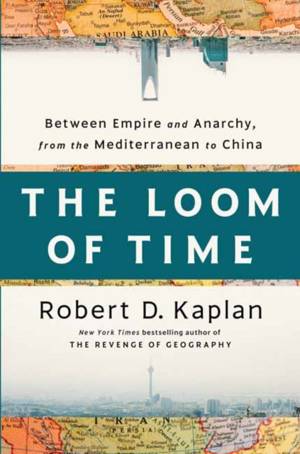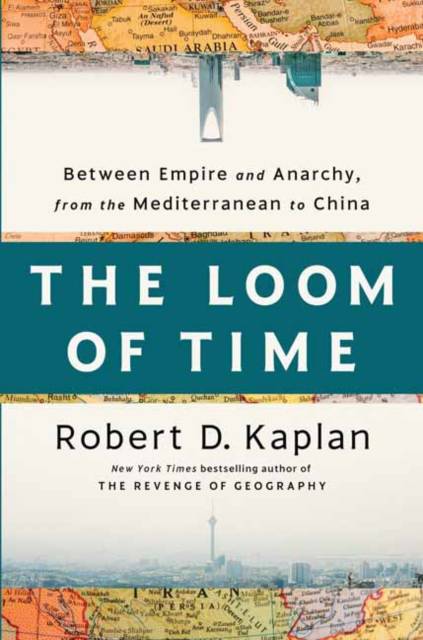
Bedankt voor het vertrouwen het afgelopen jaar! Om jou te bedanken bieden we GRATIS verzending (in België) aan op alles gedurende de hele maand januari.
- Afhalen na 1 uur in een winkel met voorraad
- In januari gratis thuislevering in België
- Ruim aanbod met 7 miljoen producten
Bedankt voor het vertrouwen het afgelopen jaar! Om jou te bedanken bieden we GRATIS verzending (in België) aan op alles gedurende de hele maand januari.
- Afhalen na 1 uur in een winkel met voorraad
- In januari gratis thuislevering in België
- Ruim aanbod met 7 miljoen producten
Zoeken
The Loom of Time
Between Empire and Anarchy, from the Mediterranean to China
Robert D. Kaplan
Hardcover | Engels
€ 34,95
+ 69 punten
Uitvoering
Omschrijving
A stunning exploration of the Greater Middle East, where lasting stability has often seemed just out of reach but may hold the key to the shifting world order of the twenty-first century.
"Continuing Robert D. Kaplan's work as the premier American scholar of geopolitics... a book that everyone who wants to understand the real forces that decide war and peace should read."--John Gray, author of The New Leviathans: Thoughts After Liberalism
The Greater Middle East, which Robert D. Kaplan defines as the vast region between the Mediterranean and China, encompassing much of the Arab world, parts of northern Africa, and Asia, existed for millennia as the crossroads of empire: Macedonian, Roman, Persian, Mongol, Ottoman, British, Soviet, American. But with the dissolution of empires in the twentieth century, postcolonial states have endeavored to maintain stability in the face of power struggles between factions, leadership vacuums, and the arbitrary borders drawn by exiting imperial rulers with little regard for geography or political groups on the ground. In the Loom of Time, Kaplan explores this broad, fraught space through reporting and travel writing to reveal deeper truths about the impacts of history on the present and how the requirements of stability over anarchy are often in conflict with the ideals of democratic governance.
In The Loom of Time, Kaplan makes the case for realism as an approach to the Greater Middle East. Just as Western attempts at democracy promotion across the Middle East have failed, a new form of economic imperialism is emerging today as China's ambitions fall squarely within the region as the key link between Europe and East Asia. As in the past, the Greater Middle East will be a register of future great power struggles across the globe. And like in the past, thousands of years of imperial rule will continue to cast a long shadow on politics as it is practiced today.
To piece together the history of this remarkable place and what it suggests for the future, Kaplan weaves together classic texts, immersive travel writing, and a great variety of voices from every country that all compel the reader to look closely at the realities on the ground and to prioritize these facts over ideals on paper. The Loom of Time is a challenging, clear-eyed book that promises to reframe our vision of the global twenty-first century.
"Continuing Robert D. Kaplan's work as the premier American scholar of geopolitics... a book that everyone who wants to understand the real forces that decide war and peace should read."--John Gray, author of The New Leviathans: Thoughts After Liberalism
The Greater Middle East, which Robert D. Kaplan defines as the vast region between the Mediterranean and China, encompassing much of the Arab world, parts of northern Africa, and Asia, existed for millennia as the crossroads of empire: Macedonian, Roman, Persian, Mongol, Ottoman, British, Soviet, American. But with the dissolution of empires in the twentieth century, postcolonial states have endeavored to maintain stability in the face of power struggles between factions, leadership vacuums, and the arbitrary borders drawn by exiting imperial rulers with little regard for geography or political groups on the ground. In the Loom of Time, Kaplan explores this broad, fraught space through reporting and travel writing to reveal deeper truths about the impacts of history on the present and how the requirements of stability over anarchy are often in conflict with the ideals of democratic governance.
In The Loom of Time, Kaplan makes the case for realism as an approach to the Greater Middle East. Just as Western attempts at democracy promotion across the Middle East have failed, a new form of economic imperialism is emerging today as China's ambitions fall squarely within the region as the key link between Europe and East Asia. As in the past, the Greater Middle East will be a register of future great power struggles across the globe. And like in the past, thousands of years of imperial rule will continue to cast a long shadow on politics as it is practiced today.
To piece together the history of this remarkable place and what it suggests for the future, Kaplan weaves together classic texts, immersive travel writing, and a great variety of voices from every country that all compel the reader to look closely at the realities on the ground and to prioritize these facts over ideals on paper. The Loom of Time is a challenging, clear-eyed book that promises to reframe our vision of the global twenty-first century.
Specificaties
Betrokkenen
- Auteur(s):
- Uitgeverij:
Inhoud
- Aantal bladzijden:
- 400
- Taal:
- Engels
Eigenschappen
- Productcode (EAN):
- 9780593242797
- Verschijningsdatum:
- 22/08/2023
- Uitvoering:
- Hardcover
- Afmetingen:
- 162 mm x 241 mm
- Gewicht:
- 642 g

Alleen bij Standaard Boekhandel
+ 69 punten op je klantenkaart van Standaard Boekhandel
Beoordelingen
We publiceren alleen reviews die voldoen aan de voorwaarden voor reviews. Bekijk onze voorwaarden voor reviews.









